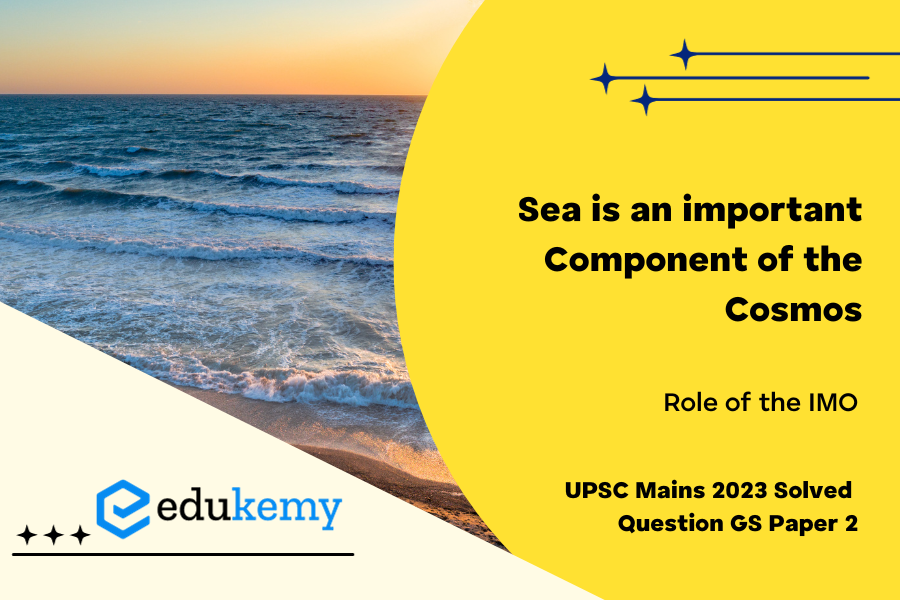UPSC Mains General Studies Paper – 1 Mains 2023
UPSC Mains Civil Services IAS Exam Question Paper – 2023
Contents
Introduction
The sea, covering approximately 71% of the Earth’s surface, is an integral Component of the cosmos. It plays a pivotal role in shaping our planet’s climate, ecosystems, and overall well-being. In light of this, the International Maritime Organization (IMO) assumes a vital role in safeguarding the environment and promoting maritime safety and security.
Body
Expound on the cosmic significance of the sea:
- Regulating Earth’s Climate: The sea serves as a massive heat reservoir, stabilising Earth’s climate by absorbing and redistributing solar heat. Its ability to store and transport heat influences global weather patterns and maintains climatic balance.
- Biodiversity and Ecosystems: Below the sea’s surface, a vast and diverse array of life thrives, from unexplored species to iconic ones like whales. Ecosystems such as coral reefs and kelp forests are essential not only for marine life but also for the planet’s oxygen production and carbon cycling.
- Global Trade and Economic Connectivity: The sea has been a vital conduit for trade, fostering cultural exchange and global interconnectivity. Over 80% of global trade by volume and 70% by value relies on maritime routes, boosting economies and international cooperation.
- Earth’s Water Cycle: The sea plays a crucial role in Earth’s water cycle, essential for life as we know it. It serves as the primary source of freshwater through processes like evaporation, condensation, and precipitation.
Transition to IMO’s role in protecting the environment:
- MARPOL Convention: Within the IMO’s environmental role, the MARPOL convention stands out. It sets global regulations under IMO’s oversight to minimise ship pollution, addressing oil, chemicals, sewage, and hazardous substances in line with broader environmental goals.
- Addressing Environmental Challenges: IMO proactively deals with issues like oil spills, ballast water, and ship emissions, which impact the marine environment significantly. Its robust regulations mitigate these threats, exemplifying a strong commitment to environmental protection.
- Sustainable Shipping Practices: IMO promotes sustainable shipping, fostering energy-efficient vessels and reduced greenhouse gas emissions. This aligns with global environmental objectives, particularly the Paris Agreement, revealing a shared dedication to preserving the marine environment sustainably.
IMO’s role in enhancing maritime safety:
- Setting Safety Standards: IMO’s safety standards are data-informed, such as the ISPS Code and SOLAS (Safety of Life at Sea) Convention 1974 reducing security threats. For example, pre-ISPS Code data revealed vulnerabilities, like the 2002 M. Star oil tanker bombing. Implementation has notably reduced such incidents.
- Seafarer Training and Qualifications: Accident data shapes seafarer training. For instance, the MV Rena grounding in 2011 led to enhanced bridge resource management training due to navigational errors.
- Global Integrated Shipping Information System (GISIS): GISIS manages maritime data, aiding informed decisions. It offers real-time ship compliance data to prevent accidents, responding to non-compliance trends.
- Incident Reporting and Analysis: Data from incidents like the Exxon Valdez oil spill led to safety improvements, including ship design and response protocols, through trend analysis.
- Technical Cooperation and Capacity Building: IMO employs data for assessing a nation’s maritime safety infrastructure, using data on response capabilities to inform aid efforts. Ex: IMO provides training and resources, as seen in their assistance to Bangladesh for enhancing their response capacity.
- SUA (Suppression of Unlawful Acts against the safety of Maritime Navigation) Convention and Protocols- Action against those committing unlawful acts (hijacking, ship seizure) against the ships were ensured. Extradition and prosecution of alleged offenders is obligatory for contracting governments.
Conclusion
Hence, the sea’s cosmic significance is essential for Earth’s climate, biodiversity, and global trade. The IMO, as the custodian of maritime regulations, is instrumental in protecting the marine environment, ensuring maritime safety, and enhancing security, thereby preserving the sea’s invaluable role in the cosmos while fostering sustainable maritime practices for the benefit of all.
In case you still have your doubts, contact us on 8792740517.
For UPSC Prelims Resources, Click here
For Daily Updates and Study Material:
Join our Telegram Channel – Edukemy for IAS
- 1. Learn through Videos – here
- 2. Be Exam Ready by Practicing Daily MCQs – here
- 3. Daily Newsletter – Get all your Current Affairs Covered – here
- 4. Mains Answer Writing Practice – here


